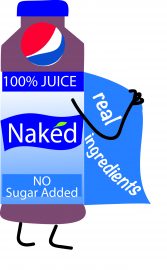Naked Juice: the beverage emperor that has no green clothes

By Elizabeth Nelums
Special to The Guardsman
The naked truth about Naked Juice is that it shares more than just a parent company with Mountain Dew and Pepsi. Many of its fruit blends contain as much sugar as other Pepsi products—if not more.
So it’s no surprise that continuing health concerns and dissatisfaction led to another lawsuit with Naked Juice on Oct. 4, making this the second time the company faced legal confrontation after a similar class action lawsuit was settled for $9 million in 2013.
The Center for Science in the Public Interest (CSPI), a nonprofit consumer advocacy group that backs safer and healthier foods, made a case for transparency in food labeling. They stated PepsiCo had deliberately and explicitly misrepresented the subsidiary juice and smoothie company it acquired in 2007.
The beverage’s strategic packaging begins on PepsiCo’s “Brands You Love” webpage, where Naked Juice is categorized under the “Good For You” section alongside Aquafina and Gatorade.
Words like green, sustainable, fresh, balance and nourish are peppered throughout the website and related social media accounts, yet little to no information is available about the drink’s actual production practices or ingredient quality.
Every bottle, online and in person, is illustrated with images of lush vegetables and fruit. Much of the brand’s marketing and promotion takes place at health and wellness-based events and stores.
If the term greenwashing is the act of misleading consumers regarding the environmental practices or impacts of a company’s product or service, then perhaps “healthwashing” is the appropriate term for what PepsiCo and other companies do when they package and advertise unhealthy products in a way that implies healthfulness.
The Hartman Group, a management consulting firm which has covered consumer food and beverage trends for over two decades, noted in recent publications for Forbes that consumers seem to be shifting more and more toward being progressive and proactive in their pursuit of health and wellness. Much of that progressiveness has manifested in the standards to which people hold food companies.
While trusting PepsiCo to make your smoothie is a bit of a fallacy, particularly when they have spent millions to fight stricter food labeling, these lawsuits represent the beginning stirrings of what the Hartman Group called a “Day of Reckoning” for food corporations. In a recently released white paper it co-authored with A.T. Kearney, the Hartman Group stated consumer perception has “shifted from previous decades’ focus on diet foods to a focus on real food as a way to maintain health. Most people now view food—particularly food with benefits—as the key to good health.”
As demand for healthier, less processed food goes up, so does the insistence on transparency from food and beverage companies, particularly when it comes to how products are made and where they come from.
Many big brands are scrambling to fit themselves into local and fresh food niches, but instead of providing quality products with honest marketing, they wrap sugar water with pictures of veggies to dupe consumers into spending money on substandard products.
Hopefully another lawsuit will force PepsiCo and similar companies to look a bit deeper than packaging to fix their health problems.
